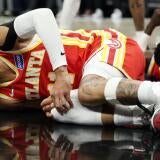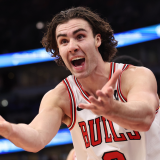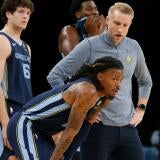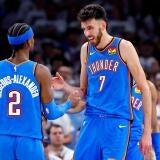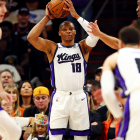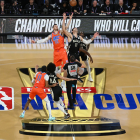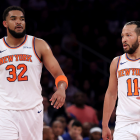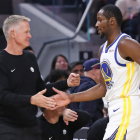The NBA Cup is back: Here's how one move could save the event and win over indifferent fans
The best version of the tournament just doesn't work with 30 teams
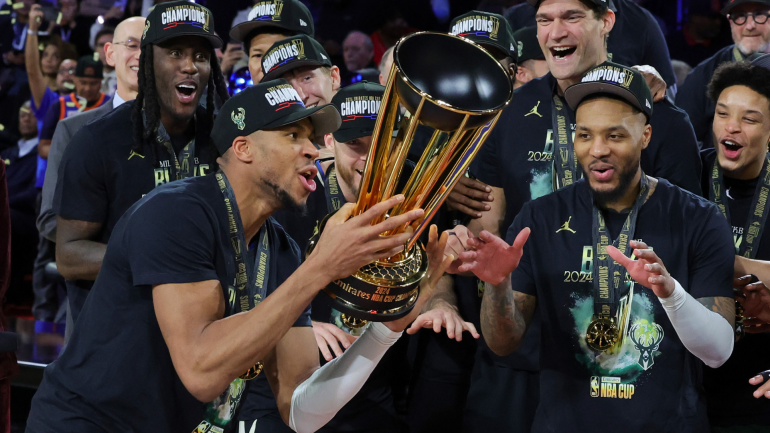
The 2025 NBA Cup begins on Friday. Don't feel ashamed if you didn't know. It's Halloween, after all. You're probably busy, and the tournament has never started this early. The group stage was a November exclusive in 2023. It extended into December last year, and used a Tuesdays and Fridays format in both seasons. This year though? It's all over the map. We begin with four Fridays: Oct. 31, Nov. 7, Nov. 14 and Nov. 21. Then the NBA will attempt to own the week of Thanksgiving with more group stage games on Nov. 25, 26 and 28.
If all of that feels arbitrary to you, well, that's sort of how it's felt for the past two years. It's hard to take a tournament seriously when it's broken up in this manner. Sometimes you'll just tune into a game and see a colorful court. It's hard to get fans in tournament mode when that tournament keeps getting flicked on and off like a light switch for more than a month. This thing drags into December once we reached the knockout stage. It's more than twice as long as the NCAA Tournament despite containing none of the inherent stakes. Fans love March Madness. October through December madness? Thus far, the response has been mostly ambivalent.
We are entering Year 3 of the event. Building sustained interest was always going to take time. But compare the reception here to the Play-In Tournament. It was introduced in 2020 in the Orlando bubble. In 2021, we got a classic LeBron James vs. Stephen Curry showdown followed by the ascent of the Memphis Grizzlies as they knocked Curry's Golden State Warriors out of the postseason. By the summer of 2022, the NBA moved to make the Play-In Tournament permanent. It had already reached widespread approval among fans.
The NBA Cup hasn't reached a similar consensus, and it's not hard to see why. The in-season tournament lacks the one thing that makes the Play-In round so fun: stakes. Fans and critics alike have argued for years about how the NBA could introduce stakes to the tournament. Compensatory picks, guaranteed playoff berths, maybe even seeding advantages, but the league justifiably wants the event to stand on its own. The idea should be to create an event that fans care about winning separate from the NBA Finals in June. That's not going to happen if teams are really just playing for a prize that will make things easier in the spring.
What the NBA can potentially remedy is the format. Every March (in college) and April (In the NBA), we're reminded of how fun single-elimination basketball is. Every November, we watch group play and point-differentials sap these Cup games of any underlying tension. As we've acknowledged, fans love March Madness. That's what makes this format so strange. Why not just copy the existing tournament that is already beloved? Who really prefers the current month-long slog that's a nightmare to actually track over a simple, "lose and you're out" format?
The NBA Cup is not going to gain meaningful traction among casual sports fans until it switches to a single-elimination format.
And that's where this event hits its first significant road block. The NBA only has 30 teams. You can't make an even bracket for 30 teams without byes. You'd need 32 for a five-round, single-elimination event. Sure, you could introduce byes to try to balance the bracket on the fly, but the NBA wants these games to count in the regular-season standings, so they need everyone to play the same number of games. This takes us back to the obvious solution: adding two teams.
When the NBA conceived this event, it may have assumed two new teams were coming. That was the widespread assumption from fans, anyway. But last offseason brought the first reported opposition to expansion since the idea began gaining traction several years ago. The Athletic reported in July that a number of owners, including James Dolan of the New York Knicks, would prefer not to introduce new partners right now that would cut into the massive media rights payout each team currently receives. The NBA is expanding into Europe with an international league, but at the moment, adding a 31st and 32nd team doesn't exactly seem imminent.
The tournament format makes sense with 32 teams. Obviously, a clean five-round, single-elimination bracket would work. In order to maintain a stable number of games for each team, the league could subsequently create new loser's brackets with each passing round. Everybody would play five total games, and everybody would place somewhere between No. 1 and No. 32. A compromise to the stakes argument could be to use NBA Cup placement as the universal playoff seeding tiebreaker. Games could continue to count in the regular season standings.
Could the NBA try something like this by including two teams from its new European league to get up to 32 tournament slots? Perhaps. It could be effective marketing for that league, after all, though if the NBA teams blow them out, the approach could backfire. The real trouble would be in assigning regular-season stakes to a game that involves teams that aren't playing in the regular season. Should an NBA team really get credit for a victory over what is effectively a minor-league team? Is that fair when the time comes to determine playoff seeding? Probably not.
All of this leaves the NBA Cup in a sort of limbo. It's not giving the league the marquee event it hoped for in its current format, yet the format it needs to thrive may or may not ever arrive. So the flawed version continues to exist, and will likely come with tweaks every year until any sort of consensus is achieved. Maybe the clustering of games in late November hits, but it also makes the earlier games seem less significant. Maybe there's a way to rearrange the groups in a more exciting way. But without the established drama of a single-elimination format, we're probably going to keep arriving in late October or early November and having to remind ourselves that a tournament we'd mostly forgotten about over the last 10 months is coming back to try and likely fail to grab the attention of the casual viewer.


